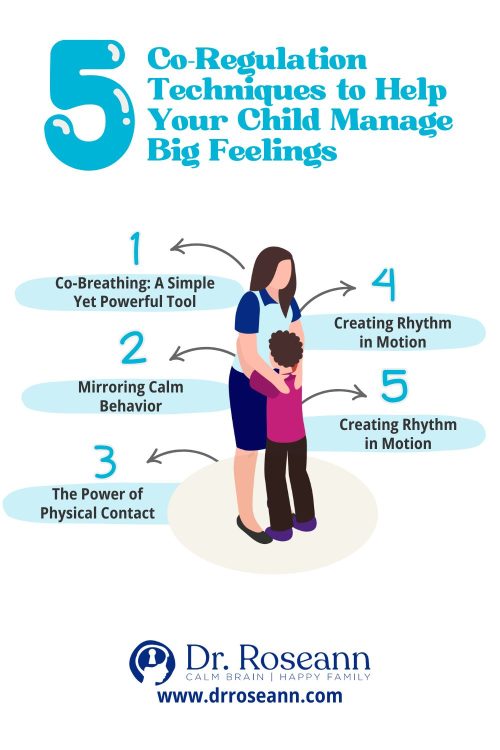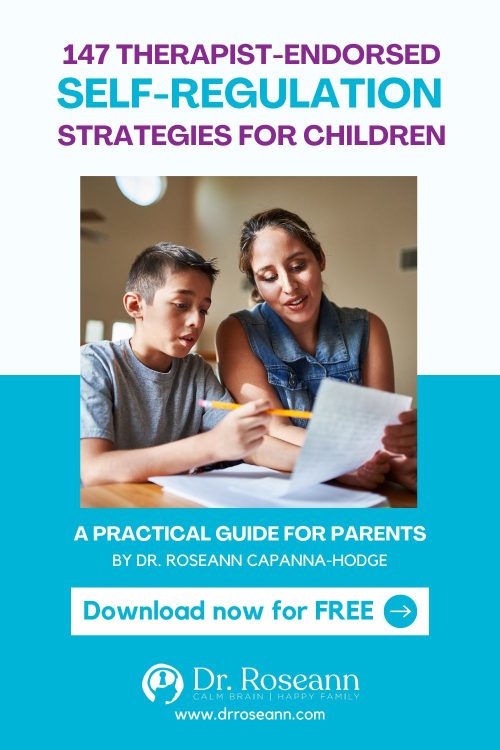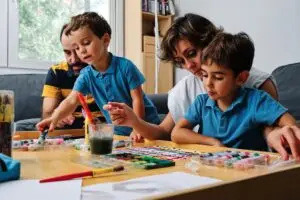Estimated Reading Time: 2 minutes
Ever feel like your child’s big emotions are impossible to manage, leaving you struggling to stay calm? You’re not alone. The good news is, co-regulation strategies can naturally help soothe your child’s nervous system while strengthening your bond.
Here are five simple yet effective techniques that can make a real difference in your child’s emotional well-being:
1. Practice Co-Breathing with Your Child
When things feel overwhelming, just breathe together with your child—it sounds simple, but co-breathing can totally help you both calm down and reconnect. This taps into your subconscious and helps regulate emotions fast.
I usually recommend starting with the 4-7-8 breathing method, but here are a few other great options:
- Box Breathing. Breathe in, hold, breathe out, hold—each for 4 counts. Repeat like tracing a box to calm the body and mind.
- Bubble Breathing. Breathe in through your nose, then exhale slowly like blowing a bubble.
- Diaphragmatic Breathing. Deep belly breathing using the diaphragm.
2. Modeling Calm Behavior
When your child is upset, your calm energy can greatly influence how they respond.
- Observe their body language
- Match their calm
- Avoid direct confrontation
- Use validating language
3. Offering Comfort through Touch
- Use simple gestures like a hug, holding hands, or even a gentle touch on the arm to offer comfort when your child is dysregulated.
- When emotions run high, saying something like “Hold on, let me give you a hug” can work wonders.
- Remember—it’s not about rewarding behavior but about expressing love and emotional support when your child needs it most.
- Always be mindful of your child’s comfort level.

4. Creating Rhythm in Motion
Rhythmic movement can work wonders for shifting emotions. Try these with your child:
- Swaying together
- Walking in rhythm
- Dancing to music
- Age-appropriate rhythm (clapping games and lullabies)
5. Using Verbal Co-Regulation
Use calming phrases like, “Let’s breathe together” to guide emotional regulation.
Offer affirmations such as, “You did great yesterday!” to reinforce progress.
Encourage emotional expression to make them feel safe and understood.
Create space for reflection to uncover insights into their emotions.
Help your child articulate feelings to build healthier emotional responses.
Parent Action Steps
For more strategies, download the 147 strategies guide and start your journey toward fostering emotional regulation in your child today!
FAQs
How do I know when my child needs co-regulation?
If your child is feeling overwhelmed, tense, upset, or having trouble calming down, it's a good time to use co-regulation techniques. Watch for signs like agitation, crying, or difficulty focusing, which indicate they may need your support.
What if my child doesn't want to engage in co-regulation?
If your child resists, give them space but stay present and calm. Respect their boundaries and let them come to you when they're ready.
Can co-regulation work for older children or teens?
Yes! Co-regulation techniques can be adapted for older kids and teens. You might need to use more subtle strategies, like encouraging deep breathing or offering positive affirmations, to meet their developmental needs.
How can I stay consistent with co-regulation practices?
Make it a regular part of your routine by integrating calming techniques into daily moments. Use deep breathing or offer physical touch whenever your child shows signs of stress or when you're transitioning between activities to create a calming environment.
Citations
Heatherton T. F. (2011). Neuroscience of self and self-regulation. Annual review of psychology, 62, 363–390. https://doi.org/10.1146/annurev.psych.121208.131616
Lobo, F. M., & Lunkenheimer, E. (2020). Understanding the parent-child coregulation patterns shaping child self-regulation. Developmental psychology, 56(6), 1121–1134. https://doi.org/10.1037/dev0000926
Paley, B., & Hajal, N. J. (2022). Conceptualizing Emotion Regulation and Coregulation as Family-Level Phenomena. Clinical child and family psychology review, 25(1), 19–43. https://doi.org/10.1007/s10567-022-00378-4
Dr. Roseann is a mental health expert in Self-Regulation who frequently is in the media:
- Healthline Understanding Self-Regulation Skills
- Scary Mommy What Is Self-Regulation In Children, And How Can You Help Improve It?
- The Warrior Parent Podcast It's Gonna Be OK! Changing Behaviors and Responses (And The Magic of Magnesium)In Your Family with Dr. Roseann Capanna-Hodge
Always remember… “Calm Brain, Happy Family™”
Disclaimer: This article is not intended to give health advice and it is recommended to consult with a physician before beginning any new wellness regime. *The effectiveness of diagnosis and treatment vary by patient and condition. Dr. Roseann Capanna-Hodge, LLC does not guarantee certain results.
Are you looking for SOLUTIONS for your struggling child or teen?
Dr. Roseann and her team are all about science-backed solutions, so you are in the right place!
©Roseann Capanna-Hodge 2025










